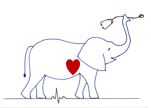Treatment of Arrhythmias Quiz
-
- What is the mechanism of action for Lidocaine?
a. Sodium channel blocker (Ia) – prolong duration of the action potential and effective refractory period
b. Sodium channel blocker (Ib) – shorten duration of the action potential and effective refractory period
c. Potassium channel blocker
d. Calcium channel blocker
2. Which of the following drugs has NO significant direct clinical effect on heart rate or rhythm?
a. Lidocaine
b. Diltiazem
c. Amlodipine
d. Amiodarone
3. Which of the following drugs is usually classified first as a Class III antiarrhythmic, rather than a class II antiarrhythmic?
a. Atenolol
b. Carvedilol
c. Esmolol
d. Sotalol
4. Sotalol is especially effective in treating which of the following cardiac diseases?
a. Boxer Cardiomyopathy (ARVC)
b. Dilated Cardiomyopathy in Dobermans
c. Hypertrophic Cardiomyopathy in cats
d. Hypertrophic Cardiomyopathy with Left Ventricular Outflow Tract Obstruction in cats
5. A dog you are treating suddenly develops ventricular tachycardia. You attempt to convert the arrhythmia with intravenous lidocaine, which fails to produce any change in the heart rhythm. Which of the following is also an antiarrhythmic drug that could be next used for the treatment of ventricular tachycardia?
a. Pimobendan
b. Procainamide
c. Digoxin
d. Diltiazem
6. Which of the following treatment options is appropriate in a horse with Mobitz type I second degree AV block?
a. Lidocaine
b. Quinidine
c. Cardiac Pacing
d. No treatment is required
7. You are working in the ICU when you notice a large breed dog with a history of significant heart disease in atrial fibrillation. Which of the following treatment options is most appropriate for managing the arrhythmia?
a. Benazepril
b. Spironolactone
c. Digoxin & Diltiazem
d. Propantheline & Atropine
8. Later that night, another dog in the ICU develops ventricular fibrillation. How do you best treat this patient?
a. Renzhong (DU‐26) acupuncture pointDigoxin & Diltiazem
b. Lidocaine & Levophed (norepinephrine)
c. Electrical DC Countershock (defibrillation)
9. Which of the following could most likely be a cause of severe bradycardia due to atrial standstill?
a. Hypercalcemia
b. Hyperkalemia
c. Hyperthermia
d. Hyperglycemia
10. Which is NOT a side effect noted regularly in animals treated with Class II antiarrhythmic drugs (Beta-blockers)?
a. Hepatopathy
b. Bradycardia
c. Low cardiac output contributing to congestive heart failure
d. Hypotension
